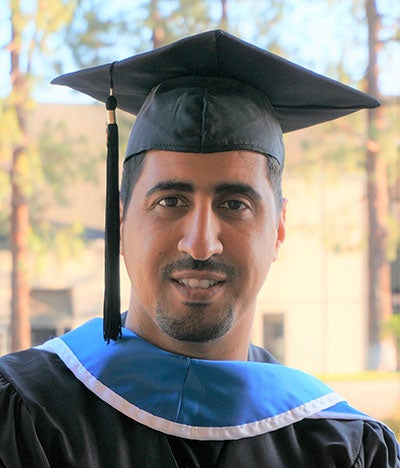
Emad Alussaif’s dream is to be a researcher, so when he was applying to doctoral programs, he decided to move from Saudi Arabia to study with some of the nation’s top special education researchers at UCR Graduate School of Education.
Emad’s research interests include designing reading instructions to help improve reading comprehension for students with intellectual disabilities (ID).
“Reading comprehension is a crucial reading skill that all students including those with intellectual disability need to be successful in school and work life. Having problems with reading comprehension can negatively affect students’ academic achievement. Students with ID exhibit deficits in reading skills that make reading comprehension challenging for them. I am interested in implementing a reading intervention that improves students with ID’s reading comprehension, such as identifying the main idea from expository text. Helping them master this skill will assist them to understand the text, to draw appropriate inferences, to study effectively, and to be a better reader,” said Emad.

During his time at GSOE, he has worked closely with faculty and presented his research at conferences. Most recently he presented “Improving Reading Comprehension for Students with Intellectual Disability: The Effectiveness of the Main Idea and Self-Monitoring Strategy” at the 14th Annual Conference University of California Center for Research on Special Education, Disabilities and Developmental Risk (UCSPEDDR) at UCLA.
In his dissertation, Emad implemented reading intervention to teach students with ID how to identify the main idea from the text, which has been widely investigated among students with learning disabilities (LD), but little attention has been given to this strategy in improving reading comprehension for students with ID. Thus, the study aimed to address this gap in the literature. Results from the study revealed the effectiveness of the main idea and self-monitoring strategy in improving reading comprehension for students with ID. The findings are promising, and provide evidence that students with ID are capable to learn more complex reading skills and can benefit from reading interventions that have been found to be effective for students with other disabilities such as learning disabilities.
When asked what has been one of his favorite things about the program, Emad said, “The faculty provide us with the tools, methods, and knowledge that shape our way of thinking systematically and scientifically. The professors work closely with you, and they are happy to help you anytime no matter where you from are, what language you speak, or what type of help you seek.”
Now, with his doctorate in hand and a wealth of hands-on research, Emad plans to return home to help students with disabilities improve their reading abilities.